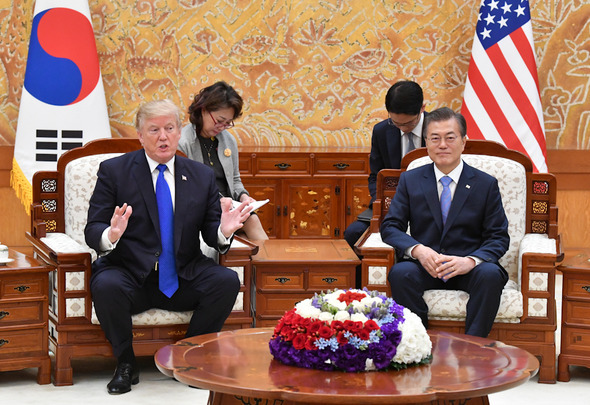 |
|
US President Donald Trump speaks with South Korean President Moon Jae-in during a summit at the Blue House on Nov. 7. (Blue House Photo Pool)
|
SK likely to be pressured for increased purchases of American weapons and shale gas
US President Donald Trump’s emphasis on the bilateral trade imbalance during his summit with South Korean President Moon Jae-in and his description of the trade deficit as something that must be dealt with strongly indicate that the negotiations to revise the South Korea-US Free Trade Agreement (KORUS FTA) will be focused on redressing the trade deficit. While Trump’s remarks about trade issues were more moderate than before, the FTA negotiations and South Korea’s reduction of its trade surplus with the US amid continuing pressure from the US are new challenges facing the South Korean government. In Trump’s remarks before the expanded bilateral meeting at the Blue House on Nov. 7, Trump said, “we don’t want to have trade deficits” and “we’ll be bringing the trade deficit way down.” “We’d like to do much more business with South Korea,” he added. “But the good news is, you will be ordering,” Trump said, referring to South Korea’s acquisition of American weaponry. The expressions Trump chose were considerably milder than before, when he threatened to withdraw from the KORUS FTA and slammed it as a horrible catastrophe. During the joint press conference, he said, “I feel confident that we'll be able to reach a free, fair, and reciprocal trade deal as we renegotiate our current five-year-old trade document.” But with Trump’s renewed emphasis on the issue of the trade balance, the US looks set to regard resolving the trade deficit as the ultimate goal of the negotiations and to launch an attack focusing on sectors such as automobiles and steel where there is a large deficit. It is also possible that a wider range of sectors will be dealt with in the negotiations than expected. During the joint press conference, Trump made quite clear that the KORUS FTA “has been quite unsuccessful and not very good for the United States.” This places South Korea’s trade authorities in the position of having to work outside of the negotiations to reduce the trade deficit by increasing purchases of US weapons and imports of energy products, such as shale gas. The two leaders also agreed to quickly complete the internal implementation procedures required to initiate the KORUS FTA negotiations. “We have agreed to quickly proceed with the [internal] deliberations related to the FTA revision so that we can together enjoy the benefits of fair and balanced trade,” Moon said. “I would like to thank President Moon for instructing his trade negotiators to work closely with us to quickly pursue a much better deal,” Trump responded. As a consequence, the two countries are expected to wrap up their internal procedures soon and to enter full-scale negotiations early next year. While Trump was greeting South Korea’s cabinet ministers and aides during a welcome meeting held at the Blue House on Nov. 7, he attracted attention by having a relatively long conversation with Trade Minister Kim Hyun-chong. By Cho Kye-wan, staff reporter Please direct questions or comments to [english@hani.co.kr]






